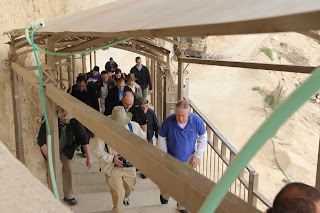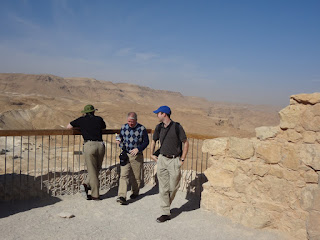What do you do when you have a free day in the Holy Land?
You go on a short, leisurely six mile walk of course! Well, at least that is
what one small group of us did. Earlier, during one of our excursions, we were
able to visit the Shepherds’ Field run by the Franciscans. There are, however,
apparently two others. One is operated by the YMCA and the other is looked
after by the Greek Orthodox. Having read in our guidebook about Orthodox fields
and its connection to a church built by St. Helen, the mother of Constantine,
our group decided to walk to the Orthodox field.
Upon
arrival at the fields we found the gate closed. It was only with the assistance
of a local that we discovered the call button on the side of the gate. After
pressing the button, the gate slid open to reveal a neatly manicured garden
area and the Orthodox church. Before entering the main church, we explored a
little and came across the remains of the older basilicas, of which the
original underground portion is still maintained. We were able to go in and
look around the small chapel’s side room. One of the things that struck me was
a set of skulls on the right side of the chapel, which had belonged to monks
from the monastery who had been martyred during a Persian invasion in the
seventh century.
From
the small underground chapel we went to the main church. When we entered, we
were amazed by the beauty of the icons that covered every inch of the interior.
The brightness of the colors and the imagery used helped to remind us that, in
that sacred space, one encounters God.
Skulls and icons. These spoke
eloquently of the faith of that place and those that served there. The icons
revealed their belief in the glory and majesty of God. They were able to use
simple human tools such as pigments and brushes to reveal an inner beauty and a
belief in the transformation that God can work. The skulls also spoke of their
reliance on God. The former monks of that place faced death rather than deny
their belief in God. May our belief and trust in God be as visible in our work
and our lives as it is the lives and deaths of the monks who lived at the
Shepherds’ Field Monastery.













